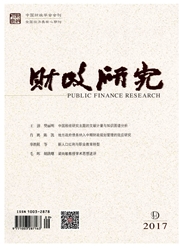

 中文摘要:
中文摘要:
当前我国地方政府在支持创业中多注重制定创业优惠政策和各种创业园区建设,易忽视创业支持系统的建设。创业支持系统是一种政策间接环境,主要形式是地方公共品供给。本文将创业环境理论引入农村非生产性公共品供给研究,认为非生产性公共品是创业支持系统的重要内容,通过提升非生产性公共品供给水平,优化创业环境,有利于激发经济活力和创造力。文章在区分影响创业选择的个体特征和社区特征的基础上,运用多层Logistic回归模型对我国东中西部293个农村社区的6801户家庭样本进行实证分析,着重研究代表农村社区特征的非生产性公共品对农户创业的影响。研究表明:农户创业不仅是个体行为,受家庭特征影响,还受所在农村社区的非生产性公共品供给影响,且不同类型的公共品对农户创业具有异质性作用。这种影响不仅体现为直接的作用力,还体现为家庭特征影响农户创业的交互作用,即公共品供给水平调节了家庭特征对农户创业选择行为的影响效应。
 英文摘要:
英文摘要:
In current China's local governments prefer making entrepreneurship preferential policies and building enterprise zones of all kinds to providing entrepreneurial support system. Business support system is a kind of indirect environmental policy and is the main form of local public goods supply. This article introduces the theory of entrepreneurship environment into non-productive rural public goods supply. The promotion of non-productive public goods supply is conducive to optimizing the entrepreneurial environment and then to stimulating economic vitality and creativity. This research has shown that entrepreneurship is not only an individual behavior. It is also affected by family characteristics and non-productive public goods supply in rural communities, which has heterogeneous function in farmer entrepreneurship. The public goods supply on one hand directly affects entrepreneurial behavior, on the other hand regulates the effects of family characteristics on farmer entrepreneurship choice behavior.
 同期刊论文项目
同期刊论文项目
 同项目期刊论文
同项目期刊论文
 期刊信息
期刊信息
